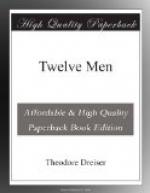About a week later I was given another and still more gratifying surprise, for one day, in his usual condescending manner, he brought to me two short pieces of fiction and laid them most gingerly on my desk with scarcely a word—“Here was something I might read if I chose,” I believe. The reading of these two stories gave me as much of a start as though I had discovered a fully developed genius. They were so truly new or different in their point of view, so very clear, incisive, brief, with so much point in them (The Second Motive; The Right Man). For by then having been struggling with the short-story problem in other magazine offices before this, I had become not a little pessimistic as to the trend of American short fiction, as well as long—the impossibility of finding any, even supposing it publishable once we had it. My own experience with “Sister Carrie” as well as the fierce opposition or chilling indifference which, as I saw, overtook all those who attempted anything even partially serious in America, was enough to make me believe that the world took anything even slightly approximating the truth as one of the rankest and most criminal offenses possible. One dared not “talk out loud,” one dared not report life as it was, as one lived it. And one of the primary warnings I had received from the president of this very organization—a most eager and ambitious and distressing example of that American pseudo-morality which combines a pirate-like acquisitiveness with an inward and absolute conviction of righteousness—was that while he wanted something new in fiction, something more virile and life-like than that “mush,” as he characterized it, to be found in the current magazines, still (1), it must have a strong appeal for the general reader (!); and (2), be very compelling in fact and clean, as the dear general reader would of course understand that word—a solid little pair of millstones which would unquestionably end in macerating everything vital out of any good story.
Still I did not despair; something might be done. And though I sighed, I hoped to be able to make my superior stretch a point in favor of the exceptional thing, or, as the slang phrase went, “slip a few over on him,” but that of course meant nothing or something, as you choose. My dream was really to find one or many like this youth, or a pungent kind of realism that would be true and yet within such limits as would make it usable. Imagine, then, my satisfaction in finding these two things, tales that I could not only admire genuinely but that I could publish, things that ought to have an interest for all who knew even a little about life. True, they were ironic, cruel, but still with humor and color, so deftly and cleanly told that they were smile-provoking. I called him and said as much, or nearly so—a mistake, as I sometimes think now, for art should be long—and bought them forthwith, hoping, almost against hope, to find many more such like them.




